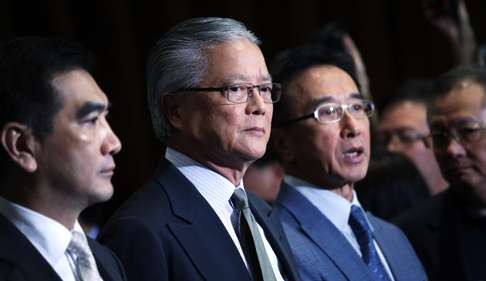
Those who reject Li Ka-shing’s idea to raise Hong Kong’s profits tax are no friends of the working class
Albert Cheng says the tycoon’s proposal should be welcomed by all levels of society, but some narrow-minded politicians in the Liberal Party have lashed out at the suggestion
Hong Kong’s already deep-rooted social conflicts are becoming increasingly serious, with a further widening of the rich-poor gap and a world-high Gini coefficient. The Occupy Central movement two years ago and the street clashes in Mong Kok earlier this year attest to the fact that such problems have intensified. Society seems on the brink of collapse.
Matters on the economic front are rather worrying. A number of key pillars spanning exports, logistics, retail, tourism and real estate are already undergoing different levels of recession. Deeply concerned with such gloomy prospects, tycoon Li Ka-shing recently suggested raising profits taxes to help increase public spending on health care and education, and narrowing the wealth gap. Most importantly, he said that measures had to be taken to help bring some hope and prospects to local communities, particularly the young generation, and address their grievances.
Li was right on the mark about the problems plaguing Hong Kong people. And his remarks indicated that, as a leader of the business community, he was prepared to pitch in and help.
Nevertheless, such noble intentions are not shared by certain local capitalists or the Liberal Party, who were quick to lash out, calling Li’s proposal a decoy against calls for a proposed “Robin Hood” tax on the super-rich and a tactic to divert Beijing’s attention from his business empire’s recent divestment moves.

Li Ka-shing calls for higher profits tax rate to tackle Hong Kong wealth gap
Hong Kong is widely known for its simple tax regime. Last fiscal year, profits tax revenue amounted to HK$140.2 billion, a 2 per cent rise over the previous year. An increase of a mere two percentage points to the 16.5 per cent rate would bring in an additional HK$17 billion. Currently, about 70 per cent of profits tax comes from big businesses and this tax alone accounts for some 48 per cent of Hong Kong’s total tax revenue.
The tax burden on small and medium-sized enterprises is actually quite manageable. Although citing SME interests, the Liberal Party’s objections to any proposed tax increase for businesses, however minor, are very much in line with its practice of ignoring the interests of the working class. Since its inception, it has championed the interests of capitalists. In the Legislative Council, it resorts to any tactics to stop the passage of bills, from a minimum wage and minimum working hours to mandatory provident fund payment offsetting and paternity leave.
Despite Hong Kong’s simple tax regime, ordinary citizens’ tax burden is anything but bearable. The government’s high land price policy is, in essence, a heavy indirect tax imposed on the public. Most have to pay hefty rental or mortgage payments in addition to ever-higher prices for consumer goods. Transport expenses are another form of indirect taxation.

Hong Kong’s ‘Superman’ Li Ka-shing should expose how the local property market is rigged in favour of tycoons
In 2006, the government proposed a sales tax to help widen the tax base. The initiative was eventually shelved amid strong objections from across society, including the business sector. Indirect taxes already place a significant financial burden on citizens. Any ill-conceived attempts to impose new levies cannot be justified.
A profits tax hike, as suggested by Li, would provide the government with more resources to address livelihood issues such as health care, education and wealth inequality and tackle them at source. This shows that certain members of the business community are mindful of their corporate social responsibility and willing to try to improve social harmony.
A small group of self-serving capitalists continue to turn a blind eye to the plight of citizens
Yet, a small group of self-serving capitalists in the Liberal Party continue to turn a blind eye to social practicalities and the plight of citizens. Rather than adopt an open-minded attitude to such well-meant proposals, they chose to attack Li and question his intentions.
Times have changed. Hong Kong people must find a way to work together and look after each other, paying heed to the needs of different communities. Things will certainly not end well for those politicians who continue to take an outdated, self-serving and narrow-minded approach at the expense of the grass roots, and the common good of society.
Albert Cheng King-hon is a political commentator. [email protected]

